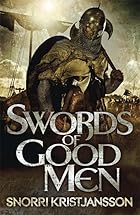

Today I have an interview with Snorri Kristjansson about his book Swords of Good men. Snorri's second book in the series will be published in May 2014, so you have time to catch up with this one, if you haven't already.
How
close is the book to real history? – how much research did you do into Viking
times? (or to put it another way why have the Vikings not got horns on their
helmets?)
Oh,
you - you - cheeky little scamp. You know full well that the Vikings never had
horns on their helmets - anyone with an IQ over the average temperature of a
Norse summer (i.e. not very much) would probably choose to *not* go into battle
with armour full of snags. Swords of Good Men is, as far as I could make it,
reasonably historically accurate. There are no doubt Viking enthusiasts out
there that can quite easily spot the odd anachronism, but I did my homework and
read up on stuff. That being said, the language is totally anachronistic by
choice and necessity - for purists, there are always the Sagas in the original,
as it were.
Apart
from the beards, the swearing and the violence (as if they’re not enough on
their own) what attracts you to writing about Vikings?
They
were badasses - but in a thoughtful way, I think. Cleave you with a conscience,
that sort of thing. The rich tradition of storytelling, the cheerfully bonkers
mythology - what's not to like? They're also a part of my cultural heritage. It
was a no-brainer, really.
Tell
us a bit about the path to publication, did you go via an agent?
Well.
I've long since accepted that my life is mostly governed by a ridiculous chain
of coincidences. I've also accepted that Proper Writers will probably at the
very least dislike me for this - but the long and the short of it is that I got
an agent before I had written so much as a short story. I was 'discovered'
doing stand-up comedy in the West End by my agent, Geraldine Cook, who thought
I was an amusing and odd sort of potato, doing jokes on stage on the same day
the Icelandic banking system looked like going kaput (it did) and people
speculated that Iceland as a country might actually go bankrupt (we didn't). I
pitched a couple of ideas to her, of which a trilogy about some badass Vikings
was quite obviously the strongest, and set to writing. That was in November
2008 - I finished the manuscript in November 2009. What followed was then
something like a year and a half of polishing, after which we started sniffing
around for interest. A number of less important publishing houses showed
an abject lack of judgement in saying no - then something started moving. Just
as we were anticipating an offer from a Big 5 direction, legendary fantasy
editor Jo Fletcher (of Jo Fletcher Books) saw it, said immediately 'Strange,
hairy Icelandic man? Perfect for my collection!' and snapped it up. The
rest, as they say, is history.
What
would you say was a greater influence, the sagas or modern fantasy?
Up
until recently, I'd say modern fantasy. However, getting stuck into the
intricacies of the Sagas has connected me to the roots as well. The Sagas are
pretty mind-blowing, once you get into them. Snorri Sturluson was essentially
the Jerry Bruckheimer of his age, with better one-liners and more violence.
Has
the book been translated into any other languages? Would you like to see if
translated into Icelandic?
At
the moment it is slated for publication in Polish, with other negotiations
ongoing. It has not been published in Iceland yet, and while I would of course
want to see my work in Icelandic I cannot deny that it would feel incredibly
weird to translate my own work. Who knows, though - maybe one day.
What
books would you recommend in the Viking genre apart from your own?
Anything
by Bernard Cornwell, Giles Christian or Tim Severin.
If
you could be a character from the book who would you be and why?
I
think I might like to be Thora. She can take care of herself, swears like a
virtuoso and mostly seems to be having a hell of a good time.
What
are you most proud of about the book?
I
am still a little surprised that it is actually finished, and that it is
actually a thing that I made. If there is such a thing as 'quietly
mind-blowing', then that's it. I'm also proud that people that I don't know
personally have read it and liked it - and that I've spoken to someone who told
me that from their point of view I'd gotten some of the more sensitive and
difficult bits pretty much right.
What
did you learn about writing whilst writing the book?
The
specifics are too many to mention. Technique, description, pace, character,
dialogue and all manner of other things. I learned an awful lot about mindset
as well. Generally, though, I'd condense it into this: I'm worse at writing and
better at editing than I think I am.
In
one sentence what is your best piece of advice for new writers?
Read
critically.
The Bristol Book Blog review:
Overall – a slightly off ending drops the rating a little but it is a rollicking good read nonetheless. Recommended.
No comments:
Post a Comment